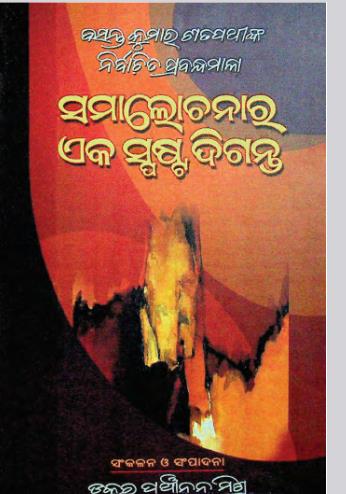Basant Kumar Satapathy’s Nirbachita Prabandhamala: Samalochanara Eka Spasta Diganta, edited by Panchanan Misra and published in 2013, is a remarkable compilation of essays that delve into the prolific works of Basant Kumar Satapathy, one of the defining literary voices in contemporary Odia literature. This book offers a critical analysis and rich commentary on Satapathy’s essays, exploring themes that are both timeless and relevant to modern readers. Through a structured collection of reflections and critiques, Misra not only highlights Satapathy’s contributions but also contextualizes them within the broader spectrum of Odia literary tradition and modern thought.
The title “Nirbachita Prabandhamala” translates to Selected Essays, indicating a curated approach to exploring Satapathy’s diverse literary output. Misra, as the editor, provides a clear framework for understanding and appreciating Satapathy’s writings, which encompass a variety of genres, themes, and stylistic nuances. The subtitle “Samalochanara Eka Spasta Diganta,” meaning “A Clear Horizon of Critique,” suggests an aim to broaden the analytical horizon regarding Satapathy’s work, facilitating a deeper understanding of his literary significance.
The book’s essays are structured thematically, allowing readers to traverse different dimensions of Satapathy’s thought processes and artistic expressions. Misra’s editorial voice serves as a guiding light, helping readers navigate through the complexities of the selected essays while offering insights that enhance the overall reading experience.
One of the central themes of Nirbachita Prabandhamala is the exploration of social issues through a literary lens. Satapathy’s essays often reflect a profound engagement with the socio-political landscape of Odisha and India at large. Misra skillfully articulates how Satapathy addresses pressing issues such as poverty, education, gender dynamics, and cultural identity. The critical discussions in the book underline Satapathy’s sensitivity to the socio-cultural context of his time, showcasing his commitment to using literature as a tool for social commentary and change.
Misra highlights Satapathy’s ability to blend literary theory with practical critique, which enriches the discourse surrounding modern Odia literature. The editor elucidates how Satapathy’s insights and observations resonate with the experiences of common people, urging readers to empathize with the societal realities that underpin his writing. This thematic focus not only celebrates Satapathy’s literary prowess but also positions him as a thinker who is deeply invested in the welfare of society.
Another important aspect of the book is its exploration of Satapathy’s stylistic innovations and his unique narrative voice. Misra discusses how Satapathy employs a conversational tone, making complex themes approachable and engaging for readers. This stylistic choice enhances the accessibility of his work, allowing a broader audience to connect with his ideas. The essays are rich in figurative language and rhetorical devices, which contributes to the aesthetic quality of his writing. Misra’s critical analysis celebrates these stylistic nuances, providing readers with a greater appreciation of Satapathy’s artistry.
Misra’s editorial insights offer a diverse range of critical perspectives on Satapathy’s work. The essays included in the compilation not only reflect the viewpoints of various scholars and critics but also foster a dialogue that encourages readers to engage with the text in multifaceted ways. This multiplicity of voices enriches the discourse surrounding Satapathy’s work and highlights the relevance of his themes in contemporary discussions about culture and identity.
The book also addresses Satapathy’s contributions to the modern Odia essay genre. Misra traces the evolution of the essay form in Odisha, situating Satapathy within this literary tradition while simultaneously acknowledging his unique contributions that pushed the boundaries of conventional essay writing. This historical context helps readers appreciate the significance of Satapathy’s work within the continuum of Odia literature.
Misra’s editing style is characterized by clarity, coherence, and a deep respect for Satapathy’s voice. He meticulously curates the essays, ensuring that readers can follow the thematic threads throughout the collection. Each essay is accompanied by insightful commentary that elucidates the key arguments and contextualizes Satapathy’s work within the broader literary and cultural framework.
The critical engagement presented in Nirbachita Prabandhamala is not merely academic; it invites readers to reflect on their own understanding of modernity, tradition, and the role of literature in social discourse. Misra’s approach encourages a participatory reading experience, whereby readers are prompted to draw connections between Satapathy’s observations and their own lived experiences.
Basant Kumar Satapathy’s Nirbachita Prabandhamala: Samalochanara Eka Spasta Diganta is an essential contribution to the understanding of modern Odia literature. Through a careful selection of essays and insightful commentary, Panchanan Misra brings Satapathy’s work into sharp focus, illuminating his profound insights into society and human experience. The book serves as both a tribute to Satapathy’s legacy and a critical resource for scholars, students, and general readers interested in the evolution of Odia literature.
As readers engage with this compilation, they are encouraged to reflect on the pressing social issues that Satapathy addresses and consider their relevance in today’s world. Misra’s work underscores the timeless quality of literary discourse and its ability to challenge, inspire, and provoke thought. This collection not only enriches our understanding of Satapathy but also reinforces the importance of literature as a vehicle for social change and human connection.
Books Info
| Books name | Loka Bigyan |
| Editor | Panchanan Misra, |
| No Of pages | 162 |
| Publisher | Bijayini Publications |
| Publication | 2013 |
| Printed At | Parama Printers |
| Distributor | NA |
Basant Kumar Satapathynka Nirbachita Prabandhamala-Samalochanara Eka Spasta Diganta sample

